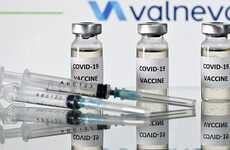
MIT Researchers Have Designed a Vaccine That Can Be Programmed
Hayley McGlone — July 13, 2016 — Tech
References: techtimes & digitaltrends
Massachusetts Institute of Technology (MIT) is often at the forefront of science and engineering innovation, and this time researchers have created a programmable vaccine. Dr. Chahal and Dr. Khan, a virologist and chemical engineer respectively, have created a programmable RNA vaccine that could transform the realm of vaccines. Inside the vaccine is RNA packaged into nano-particles that "enter the cell, mimic viral infections, raise cellular alarms and use the instructions contained within the RNA to activate the cell's defenses."
Chahal and Khan have already successfully immunized mice to diseases like Ebola and H1N1 influenza, as well as a parasite similar to the one that causes malaria. They are planning to target the Zika virus and Lyme disease next during testing. Since the vaccine is completely synthetic regardless of the disease the RNA will be programmed to immunize against, the production of the vaccine will be identical every time. The goal is for the vaccine to be utilized during outbreaks since it is quickly produced and programmable.
Chahal and Khan have already successfully immunized mice to diseases like Ebola and H1N1 influenza, as well as a parasite similar to the one that causes malaria. They are planning to target the Zika virus and Lyme disease next during testing. Since the vaccine is completely synthetic regardless of the disease the RNA will be programmed to immunize against, the production of the vaccine will be identical every time. The goal is for the vaccine to be utilized during outbreaks since it is quickly produced and programmable.
Trend Themes
1. Programmable Vaccines - Vaccines that can be customized to target different diseases using RNA can revolutionize the way vaccines are produced and administered.
2. Synthetic RNA Delivery Systems - The development of programmable vaccines requires efficient and adaptable RNA delivery systems that can be used to produce vaccines for a variety of diseases.
3. Personalized Medicine - The ability to customize vaccines based on individual needs opens up possibilities for personalized medicine and targeted disease prevention.
Industry Implications
1. Pharmaceuticals - The pharmaceutical industry can benefit from the development of programmable vaccines since it offers a way to quickly respond to outbreaks and customize vaccines for specific populations.
2. Biotechnology - The development of synthetic RNA delivery systems required to produce programmable vaccines presents opportunities for innovation in biotechnology and gene therapy.
3. Healthcare - The development of personalized and customizable vaccines can revolutionize the way healthcare is delivered and disease prevention is conducted.
2.4
Score
Popularity
Activity
Freshness
























